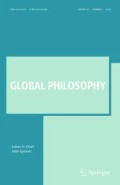Abstract
In “Function and Concept” and “On Concept and Object”, Frege argued that certain differences between dependent and independent meanings were inviolable and “founded deep in the nature of things” but, in those articles, he was not explicit about the actual consequences of violating such differences. However, since by creating a law that permitted one to pass from a concept to its extension, he himself mixed dependent and independent meanings, we are in a position to study some of the actual consequences of his having done so. To make certain of Frege’s ideas about the inviolability of logical form more tangible, I describe a string of very interrelated consequences that his attempt to transform dependent meanings into independent meanings actually brought in its wake.
Similar content being viewed by others
Notes
In “Incomplete Symbols, Dependent Meanings, and Paradox”, in Husserl’s Logical Investigations, D. Dahlstrom (ed.), Dordrecht: Kluwer, 2003, 69–93, I connect Husserl’s reflections in the 4th Logical Investigation with some of Frege’s and Russell’s ideas on this matter (Hill 2003).
In Frege’s special vocabulary, functions, concepts, predicates were ungesättigt, which has usually been translated as ‘unsaturated’. Here I translate ungesättigt as ‘unfilled’, which I find clearer in meaning and more natural. According to my Random House College Dictionary, ‘to saturate’ means 1. to cause (a substance) to unite with the greatest possible amount of another substance through solution, chemical combination, or the like. 2. to charge to the utmost, as with magnetism. 3. to soak, impregnate, or imbue thoroughly or completely. 4. to destroy (a target) completely with many bombs or missiles. 5. to furnish (a market) with goods to the point of oversupply. None of these meanings speak to Frege’s concerns. I have also modified the published translations.
For example, in my “Reference and Paradox”, Synthese 138, 2004, 207–32.
J. L. Austin chose to translate ‘selbständiger’ as ‘self-subsistent’ rather than using the more common translation ‘independent”, which better serves the purposes of the present essay.
References
Boolos G (1986/1987) Saving Frege from contradiction. In: Demopoulos, pp 438–453
Boolos G (1987) The consistency of Frege’s foundations of arithmetic. In: Demopoulos, pp 211–234
Boolos G (1993) Whence the contradiction? In: Schirn (ed), pp 234–252
Demopoulos W (ed) (1995) Frege’s philosophy of mathematics. Harvard University Press, Cambridge
Dummett M (1991) Frege: philosophy of mathematics. Duckworth, London
Dummett M (1996) Reply to Boolos. In: Schirn (ed), pp 253–260
Frege G (1879) Begriffsschrift, a formula language, modeled upon that of arithmetic, for pure thought. In: van Heijenoort (ed), pp 5–82
Frege G (1884) The foundations of arithmetic. 2nd rev. edn, 1986, Blackwell, Oxford
Frege G (1891) Function and concept. In: Frege 1980b, pp 21–41
Frege G (1892) On concept and object. In: Frege 1980b, pp 42–55
Frege G (1893) Basic laws of arithmetic. University of California Press, Berkeley (1964)
Frege G (1903) Frege on Russell’s paradox. In: Frege 1980b, pp 214–224
Frege G (1979) Posthumous writings. Basil Blackwell, Oxford
Frege G (1980a) Philosophical and mathematical correspondence. Blackwell, Oxford
Frege G (1980b) In: Geach P, Black M (eds) Translations from the philosophical writings. Blackwell, Oxford, 3rd edn (1952)
Heck R (1993) The development of arithmetic in Frege’s Grundgesetze der Arithmetik. In: Demopoulos (ed) 1995, pp 257–294
Hilbert D (1925) On the infinite. In: van Heijenoort J (ed), Harvard University Press, Cambridge, 1967, pp 367–392
Hill CO (1997) Rethinking identity and metaphysics, the foundations of analytic philosophy. Yale University Press, New Haven
Hill CO (1999) In: Schirn M (ed) Circling Gottlob Frege, review of Frege importance and legacy. Diálogos, January, pp 203–213
Hill CO (2003) Incomplete symbols, dependent meanings, and paradox. In: Dahlstrom DO (ed) Husserl’s logical investigations, Kluwer, Dordrecht, pp 69–93
Hill CO (2004) Reference and paradox. Synthese 138:207–232
Hill CO, Rosado Haddock G (2000) Husserl or Frege, meaning, objectivity and mathematics. Open Court, Chicago
Husserl E (1929) Formal and transcendental logic. M. Nijhoff, The Hague, 1969
Jourdain P (1912) The development of the theories of mathematical logic and the principles of mathematics. Q Pure Appl Math 48:219–315
Marcus RB (1960) Extensionality. Mind 69:55–62
Marcus RB (1993) Modalities. Oxford University Press, New York
Quine WVO (1956) Quantifiers and propositional attitudes. J Phil 53:177–187
Quine WVO (1960) Word and object. The M.I.T. Press, Cambridge
Quine WVO (1961) From a logical point of view. Harper’s Row, New York (1953)
Russell B (1903) Principles of mathematics. Norton, London
Russell B (1919) Introduction to mathematical philosophy. Allen & Unwin, London
Russell B (1927) Principia mathematica to *56. Cambridge University Press, Cambridge, 2nd edn (1964)
Russell B (1956) In: Marsh RC (ed) Logic and knowledge, essays 1901–1950. Allen & Unwin, London
Russell B (1973) In: Lackey D (ed) Essays on analysis. Allen & Unwin, London
Schirn M (ed) (1996) Frege: importance and legacy. de Gruyter, Berlin
Author information
Authors and Affiliations
Corresponding author
Rights and permissions
About this article
Cite this article
Hill, C.O. On Fundamental Differences between Dependent and Independent Meanings. Axiomathes 20, 313–332 (2010). https://doi.org/10.1007/s10516-010-9104-1
Received:
Accepted:
Published:
Issue Date:
DOI: https://doi.org/10.1007/s10516-010-9104-1




